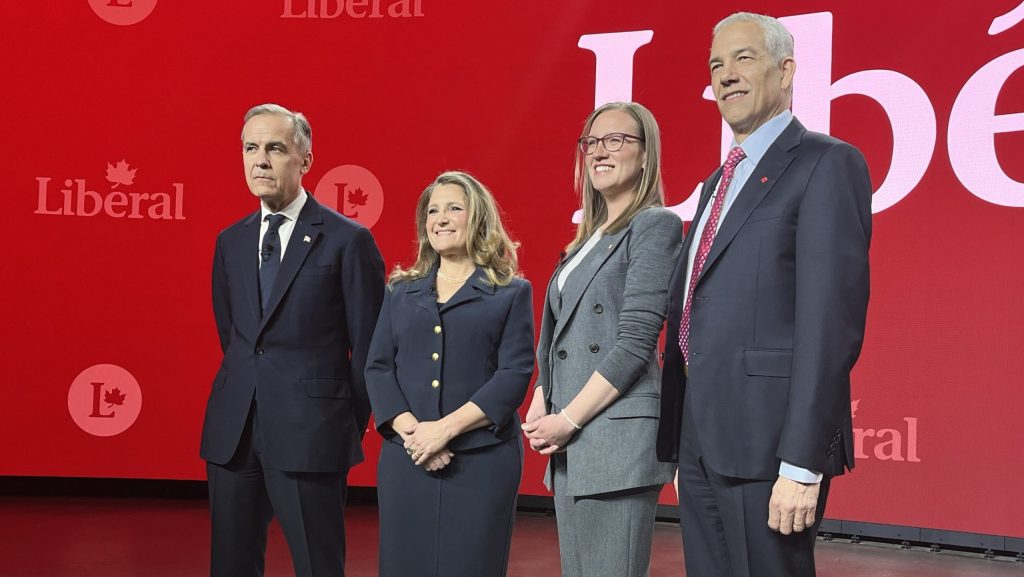The recent French-language Liberal leadership debate held in Montreal prominently featured discussions on how Canada should respond to U.S. President Donald Trump’s numerous economic threats and assertions concerning Canadian sovereignty. Issues raised included proposed tariffs on Canada and Trump’s controversial suggestion that Canada might become the "51st American state." These topics were recurrent during the debate among the leading candidates, including Mark Carney, Chrystia Freeland, Karina Gould, and Frank Baylis.
Carney, viewed as the frontrunner, emphasized the necessity for Canada to leverage its natural resources, bolster its economy, and enhance relationships with the European Union and allied nations to diminish its reliance on the United States. He articulated concerns regarding Trump’s evolving stance, framing the current situation as more aggressive and isolationist than before. Carney believes that strengthening Canada’s economy will improve its negotiating power and proposed that provincial leaders collaborate to dismantle interprovincial trade barriers.
Freeland took a more confrontational approach, labeling Trump as the most significant threat to Canada since World War II. She advocated for implementing counter-tariffs against the U.S., which includes imposing a severe tariff on electric vehicles produced by Tesla. Freeland highlighted her experience in negotiating NAFTA with Trump during his first term and expressed confidence that Canada could stand up to him and emerge victorious.
Gould, the former House leader, argued for a calm approach to counteracting Trump's chaotic tendencies and indicated that the U.S. president respects strength. She stressed the importance of the federal government aiding Canadian businesses in penetrating international markets, applauding how Canadians have unified in response to Trump's threats.
Baylis criticized Trump as an intimidator and shared his experiences with similar personalities in the business world. He proposed that talks of negotiation were futile, given that previous trade agreements were not being upheld. Instead, he suggested forming an economic alliance among Canada, the U.K., Australia, and New Zealand as a countermeasure.
The candidates also criticized Conservative leader Pierre Poilievre's relationship with Trump, accusing him of being overly subservient to the U.S. president. Carney noted the need for stronger opposition to Trump, while Freeland described Poilievre as too weak to confront him effectively.
The debate also touched on critical domestic issues, particularly health care. Baylis presented a comprehensive plan aiming to overhaul Quebec's health care system by increasing the number of nurse practitioners, improving home care, and expanding pharmacists' roles in diagnosis. Freeland proposed to recruit healthcare professionals from the U.S., while Carney discussed leveraging technology in health care and addressing barriers for medical professionals. Gould emphasized the need for accountability in provincial spending concerning federal health transfers.
Taxation policies garnered attention as Freeland pledged to reduce middle-class taxes and increase the availability of daycare spots. In contrast, Baylis focused on enhancing productivity through fiscal discipline, while Gould aimed to assist first-time homebuyers by lowering taxes and addressing homelessness. Carney echoed the sentiment of tax reduction, particularly for families, while advocating for investments in daycare programs.
The debate also touched on immigration, with Carney proposing a temporary cap on immigration levels to alleviate the current housing crisis. Freeland maintained that Canada should remain welcoming to immigrants but underscored the need for adequate social services. Gould expressed concerns about overly ambitious immigration targets and called for provincial consultations.
In addressing crime and vehicle theft, distinctions were drawn among candidates on how to effectively tackle these issues. Gould suggested legislative amendments to enhance police capabilities, Freeland called for tighter border controls, and Baylis advocated for negotiations with the U.S. regarding illegal weapons crossing the border.
On environmental issues, Freeland expressed intentions to abolish the carbon tax for consumers, while Baylis criticized the effectiveness of the tax. Gould affirmed her commitment to combatting climate change without abandoning the carbon tax, and Carney proposed replacing the consumer carbon tax with a model that holds large polluters accountable.
Lastly, discussions on international affairs covered the Israel-Palestine conflict, where Gould advocated for peace and humanitarian aid. Freeland and Carney condemned Trump’s stance on Palestinian issues. On the aid to Ukraine, Freeland emphasized the necessity of support from Canada to help Ukraine defend itself, while Gould focused on maintaining strong alliances with European nations.
The dynamic debates not only highlighted the candidates' differing views on Trump and American relations but also showcased their approaches to critical domestic issues, setting the stage for the impending leadership vote scheduled for March 9.










